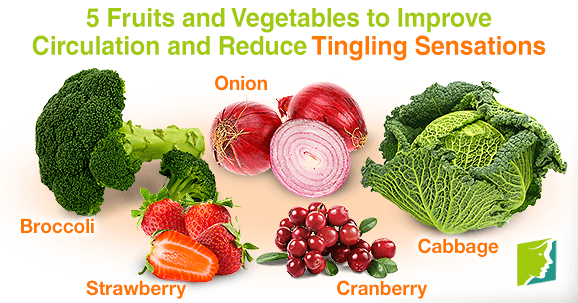Tingling sensations, especially in your extremities, can become increasingly frequent during times of hormonal changes, such as during menopause. Tingling sensations appear due to the disruptions in estrogen production, since this hormone has some - still obscure - effects on neurological function.
Decreases in estrogen levels may make it more difficult for the body to absorb some nutrients and vitamins. Deficiencies in these vitamins can impact the nervous system and cause tingling sensations. By eating certain fruits and vegetables, you can take steps towards relieving these sensations.
Broccoli
Your liver is responsible for breaking down the excess hormones that your body is no longer using. Broccoli contains phytonutrients that can aid it in doing so, and in turn help the body retain balanced hormone levels. Other cruciferous vegetables that are rich in phytonutrients are kale and cauliflower.
Cranberry
Iodine-rich foods are an essential part of balancing hormones and relieving tingling sensations because they keep the hormone production in your thyroid adequate. Fresh cranberries are a great source of iodine, both eaten fresh or in juice form. Other excellent sources of iodine are beans, seaweed, and yogurt. However, it is generally advised that those with diagnosed thyroid disorders avoid foods containing iodine.
Onion
In order to break down excess hormones, your liver needs sulfur compounds. Onions are one of the best and easiest ways to get enough sulfur compounds into your diet to help the liver to rebalance your hormones. Another good way to add sulfur compounds is by increasing your consumption of onion's close relative, garlic.
Strawberry
Vitamin C (ascorbic acid) is an essential part of any healthy diet, and it is particularly useful in helping to maintain healthy skin. Though oranges are the most famous source of vitamin C, strawberries are one of the lesser known great providers of it. Leafy green vegetables and bell peppers also contain a lot of vitamin C.
Cabbage
Eating cabbage on a regular basis will increase the amount indole-3-carbinol that you consume. This compound helps towards promoting the production of estrogen, which can contribute to rebalancing your hormone levels. Other sources of this compound include bok choy, kale, and collard greens.
By increasing your intake of the fruits and vegetables listed above, you will be taking steps to improve your overall health. It is also important to get enough vitamin B12. Around 3% of people have a serious B12 deficiency, and 20% have a borderline deficiency. This is one of the main culprits of tingling sensations in older adults. B12 is found mainly in meat and seafood, so vegetarians are at a higher risk. Talk to your doctor if you feel you may be suffering from a vitamin deficiency. Click on the following link to learn more about treating tingling sensations.
Sources
- Evert, A. (2013). Iodine in diet: MedlinePlus Medical Encyclopedia. Retrieved December 10, 2015, fromhttp://www.nlm.nih.gov/medlineplus/ency/article/002421.htm
- Michnovicz, J.J., Adlercreutz, H. & Bradlow, H.L. (1997). Changes in levels of urinary estrogen metabolites after oral indole-3-carbinol treatment in humans. Journal of the National Cancer Institute, 89(10), 718-723. Retrieved from http://www.ncbi.nlm.nih.gov/pubmed/9168187




